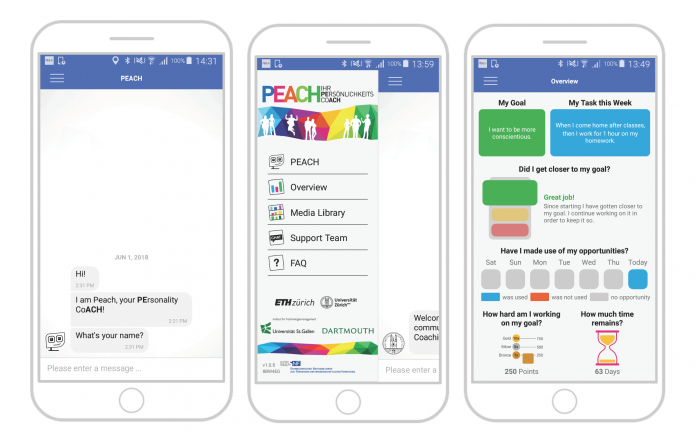Dr Mathias Allemand from University of Zurich and Dr Mirjam Stieger from Brandeis University tell us what we need to know about digital personality change interventions and research in the field
An emerging and exciting research question in personality science is whether and how people can intentionally change their personality through intervention. Although this question can be approached in different ways, one particularly attractive and innovative avenue is to use digital technology to support people in changing aspects of their personality.
Personality does matter
Research on personality development typically focuses on personality traits such as emotional stability, extraversion, openness to experience, agreeableness and conscientiousness. Personality traits can be thought of as relatively enduring patterns of thoughts, feelings, and behaviours, in contrast to emotional states, which are typically more transient and emerge in response to specific situations. Evidence suggests that personality traits predict a wide range of important outcomes such as economic well-being, relationship success, health and well-being, and even longevity. For example, people high in conscientiousness show better academic achievement, job performance, physical health, relationship quality, and longevity.
In addition, the economic costs of low emotional stability are enormous and exceed those of common mental disorders. For these reasons, personality traits might represent an important target for interventions to improve individual welfare and public health.
Change does matter
Evidence suggests that personality development in adulthood is characterised both by stability and change. While some aspects of our personality are formed relatively early and remain stable over the entire lifespan, evidence suggests that personality traits can and do change and evolve as we move through the challenges and opportunities of adulthood into old age. A large body of longitudinal evidence has shown that personality traits continue to develop across adulthood into old age albeit at a slow rate. The overall picture suggests that people become more emotionally stable, more confident, agreeable, and conscientious with age.
Furthermore, longitudinal research has shown that changes in personality traits also predict important life outcomes later in life. For example, recent work found that increases in self-control–a facet of conscientiousness–across the adolescent years predict higher relationship and job satisfaction in adulthood. In other words, not only personality trait levels, but also whether and to what extent they develop in one direction or another, can have consequences.
Intentional personality change
The fact that personality traits can change over longer time periods and that changes in personality traits may bring about positive outcomes leads to the important follow-up question of whether and how people can intentionally and permanently modify or change their personality traits over relatively short time periods. The first evidence for personality change through intervention comes from clinical psychology and psychotherapy. A recent meta-analytic review has shown that some aspects of personality do change in response to clinical interventions, even though these interventions primarily targeted clinical problems but not personality traits. Specifically, people became more emotionally stable and more extraverted as a result of clinical interventions.
Another line of research has shown that many people have the desire to change some aspects of their personality. Interestingly, the desire to change personality aspects is not only prevalent among younger adults, but also middle-aged and older adults’ express desires to change aspects of their personality. This desire and motivation for self-change is the main prerequisite for the development and implementation of personality change interventions.
Digital personality change interventions
A particularly exciting question is whether and how digital technology can be used to help people attain their personality change goals. Digital personality change can be thought of intervention efforts that make use of digital technology such as smartphone applications to deliver the intervention, to provide support and guidance, and to encourage and remind people to take small steps into the desired direction in a timely and ecologically attuned manner in their everyday lives.
An interdisciplinary research project funded by the Swiss National Science Foundation (No. 162724) was dedicated to the investigation of intentional personality change through digital intervention. The goals were to test the efficacy of digital personality change interventions and to examine the underlying processes and mechanisms that improve the outcomes of the interventions. As part of the project, we developed a smartphone application called PEACH (PErsonality coACH). The goal of the PEACH application was to coach, support, and guide people who have the desire and are motivated to change a personality trait with the help of digital technology.
In a large-scale randomised controlled trial, we examined the effects of the three-month personality change intervention using the PEACH app. The findings suggest that participants who received the intervention showed greater self-reported changes compared to participants in the waitlist control group who had to wait one month before receiving the intervention. Observers such as friends, family members or intimate partners also detected personality changes, but with smaller effect sizes than the self-reports. Moreover, self- and observer-reported changes persisted until three months after the end of the intervention. This study provides the strongest evidence to date that personality traits can be changed through a digital coaching intervention in non-clinical samples.
Our more recent work focuses on targeting and modifying specific personality traits such as the self-control ability through digital technology. Given that digital personality change interventions prove effective, they could be implemented in various non-clinical settings due to their low-threshold character and technical scalability. Such an approach could reach a large number of people outside of clinical settings, leading to wider social, health, and economic benefits.
Please note: This is a commercial profile











